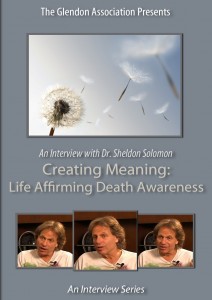Dr. Sheldon Solomon On Death Awareness and Culture Formation: Exclusive Interview
Dr. Sheldon Solomon on Death Awareness and Culture Formation
[SlideDeck2 id=13293]
Sheldon Solomon talks about Ernest Becker’s description of how death awareness fashions the formation of culture.
SS: These are ideas we kind of, I think, borrowed or maybe extrapolated a little from what we gleaned from Ernest Becker. As you know, his argument is that people are smart enough to know that we’ll someday die and that that disquieting realization is the psychological impetus for the formation of culture. And that, in a sense, culture serves lots of purposes — but amongst them is to give us a sense that we’re persons of value in a world of meaning and thus eligible for the safety and security of immortality either literally or symbolically. And Becker, being an anthropologist in the heyday of cultural relativism, then had to come up with, I think what’s a response to the proverbial $10,000.00 question as it were. And that is, “Well, alright, so does that make one culture the same as another?” You know, if you’re saying that death denial is a universal human affectation and that culture is the means by which we manage the potential terror that the awareness of our death engenders, does, so is it really, “Anything goes?” Or are cultures functionally equivalent?
And, you know, back in the day, I think cultural relativism, this idea that we suspend our judgments and that we try to perceive other people, you know, metaphorically to walk a mile in their shoes makes a good deal of sense. On the other hand, Becker, as well as every other anthropologist frankly, as I get to read them directly, so even, what is his name – Melville Herskovitz, the original cultural relativism guy – they’re very clear about cultural relativism being a worthy goal to strive to approximate, that by no means absolves us of the responsibility to make moral judgments. And so here’s back to what you asked about, you know, well, what’s a good culture? And, what we’ve written about, and, again, I’m pretty sure we got this from the back part of Ernest Becker’s Escape from Evil, where he’s really struggling. It’s the end of his life and he’s writing these books where each book gets a little bit darker. You know, he started out very optimistic and by this book, he starts the book by saying, “I’m pessimistic, but I’m not cynical.” And I like that distinction. He’s like, “You know, I think things are troubled but I’m not yet willing to give it up.” He does say, “I wonder at times if humans are a viable form of life.” And that’s a really chilling notion, you know, when he says, “You know, we really haven’t been here that long.” And maybe it was a gigantic mistake to have, like, self- conscious pieces of mortal meat. You know, good idea in the short run, but disastrous in the long run. Well, if we’re not doomed for impending extinction, then, you know, what are the other alternatives?
Order a DVD of Dr. Sheldon Solomon’s full interview with PsychAlive, “Creating Meaning“
 In this DVD, Dr. Sheldon Solomon addresses a variety of topics concerning how human beings can create meaningful lives in the face of death. In a lively and candid style, Dr. Solomon discusses the development of Terror Management Theory, the ways in which people form defenses against death anxiety and the concept of life affirming death awareness, arguing that we can “accept the reality of the human condition and parlay that into bringing out the best in us. ” He also addresses the societal effects of death awareness, including the social nature of human beings, the role of education and government, and the elements that make up an ideal society. Ultimately, Dr. Solomon advocates that people treat one another humanely and with a greater emphasis on compassion.
In this DVD, Dr. Sheldon Solomon addresses a variety of topics concerning how human beings can create meaningful lives in the face of death. In a lively and candid style, Dr. Solomon discusses the development of Terror Management Theory, the ways in which people form defenses against death anxiety and the concept of life affirming death awareness, arguing that we can “accept the reality of the human condition and parlay that into bringing out the best in us. ” He also addresses the societal effects of death awareness, including the social nature of human beings, the role of education and government, and the elements that make up an ideal society. Ultimately, Dr. Solomon advocates that people treat one another humanely and with a greater emphasis on compassion.









Leave a Reply